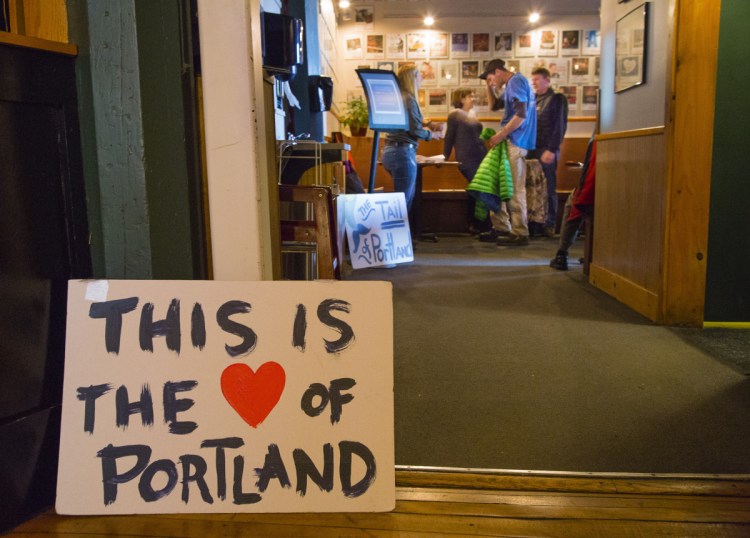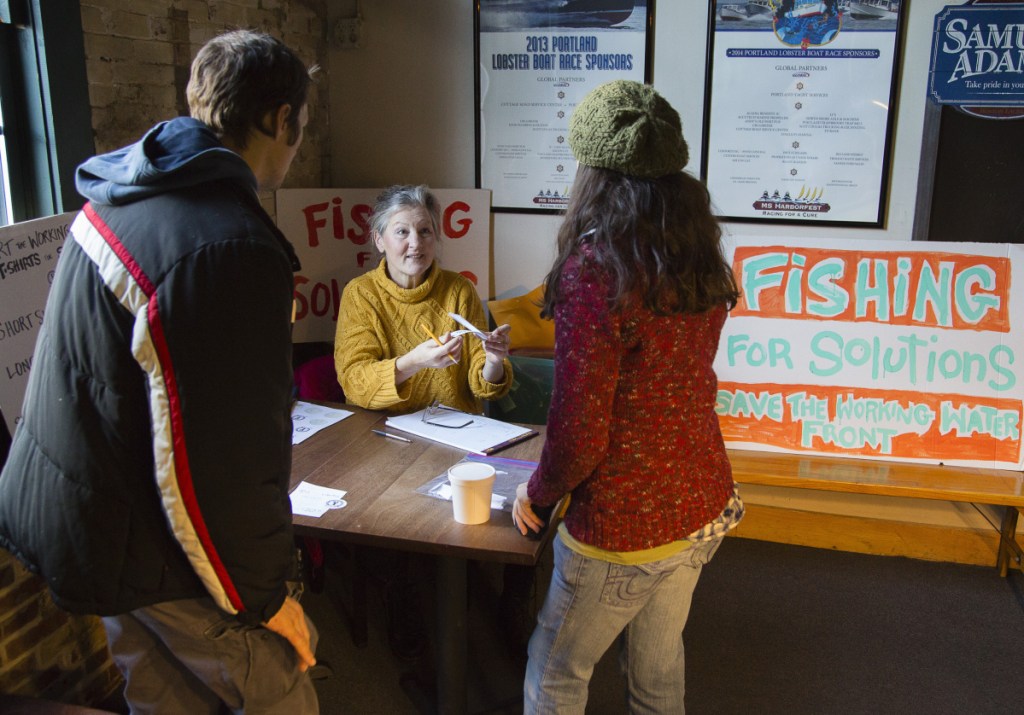Dozens of fishermen, their families and friends gathered at a pub on Portland’s waterfront Sunday to kick off what could turn out to be a historic campaign to save their industry from extinction.
Citizens behind the movement to freeze or contain development on the waterfront met in Andy’s Old Port Pub, a Commercial Street bar and restaurant, to collect petition signatures, raise money, and hand out informational materials.
They will be seeking a referendum that aims to protect the working waterfront zone on Commercial Street by restoring the water dependency use requirement – adopted by referendum in 1987 – that they claim has been slowly eroded by dozens of zoning amendments the City Council has passed at the urging of developers and waterfront property owners.
Supporters of the referendum say that changes are needed if citizens want to preserve Maine’s fishing culture and way of life. Organizers of the petition drive need to collect at least 1,500 signatures by January in order for the waterfront zoning amendment initiative to be voted on at a citywide referendum in May.
“This citizen initiative is critical to our future,” said Willis Spear of Yarmouth, a lobsterman who has been fishing for more than 50 years. “The development on the waterfront is outpacing what can be handled. Hopefully, this will slow things down.”
The citizens initiative would make sweeping changes to land-use rules governing three sections of the city’s waterfront, from the Eastern Promenade to the Veterans Memorial Bridge. The proposal would further restrict uses that don’t rely on water access and narrow the scope of contract and conditional rezoning options that could be used to expand development options.
Commercial fishermen say the city needs to act before uses such as offices, restaurants, hotels and condominiums force them off the waterfront.
At Sunday’s kickoff event, supporters handed out an October paper written for Maine Lawyers Review by Orlando Delogu, a professor emeritus of the University of Maine School of Law. Delogu has come out in support of the working waterfront campaign.
“Though aspects of the working waterfront have never been healthier – the cruise boat business, Eimskip, Sprague – we keep squeezing it, making its survival ever more difficult, narrowing its full potential by narrowing the space available for water-dependent uses,” Delogu wrote.
“Portland seems trapped in a penchant for shortsightedness. It is more enamored with the immediate returns from non-marine uses on its waterfront – a hotel, parking garage, upscale shops and offices – than it is with the long-term returns that a working waterfront would provide. The city fails to grasp that with proper zoning it can have both.”
Developers and waterfront property owners say they need mixed uses on the waterfront to pay for the maintenance of aging piers. Portland is also experiencing a development boom of luxury condominiums, hotels and office buildings.
Developer David Bateman has proposed a four-story hotel, retail and office complex with a parking garage at Fisherman’s Wharf, a property that is currently composed of surface parking lots and the Portland Lobster Co. restaurant. In June, dozens of fishermen and their supporters protested Batemen’s project, which is still pending city review.
Fishermen have also expressed concerns about the Rufus Deering Lumber Co. site, which has been approved for redevelopment into a mixed use hotel and condominium project.
And there is a development that includes a 600-vehicle garage at the Hamilton Marine site at 100 Fore St. under review by city planners.
Fishermen said the public may not fully realize the day-to-day pressures that they face just trying to do their job on Portland’s waterfront.
During the summer months, when tourist traffic across Maine and especially at a tourist destination like Commercial Street peaks, fishermen can spend hours trying to unload traps, delivering product to buyers, or hunting for a parking space. Bait and fish products are perishable and need to be moved quickly before they spoil.
“Parking has been lost to non-marine uses. The hotels have taken a lot of the parking that was once available,” Spear said.”You can put a hotel anywhere, but that is not the case with a fisherman.”
Keith Lane of Portland, a lobsterman who has been fishing since 1968, said the congestion and traffic gridlock on Portland’s waterfront is killing the fishing industry.
“You can’t conduct business if you can’t get to your boat,” Lane said. “We need to do something because these non-marine uses are going to exterminate the fishing industry.”
Marshall Spear of Yarmouth, Willis Spear’s son, has been fishing only since 2003, but it’s his livelihood and he worries that one day he may find himself without a berth at Custom House Wharf if upscale waterfront development continues at its current pace.
He’d like to see the city strike a balance that allows some development but also protects Portland’s working waterfront. “For me it’s the traffic and it’s access. The writing is on the wall,” Spear said. “Our wharf could be sold tomorrow, and for me that’s a scary thing.”
Dennis Hoey can be contacted at 791-6365 or at:
dhoey@pressherald.com
Copy the Story LinkSend questions/comments to the editors.





Success. Please wait for the page to reload. If the page does not reload within 5 seconds, please refresh the page.
Enter your email and password to access comments.
Hi, to comment on stories you must . This profile is in addition to your subscription and website login.
Already have a commenting profile? .
Invalid username/password.
Please check your email to confirm and complete your registration.
Only subscribers are eligible to post comments. Please subscribe or login first for digital access. Here’s why.
Use the form below to reset your password. When you've submitted your account email, we will send an email with a reset code.